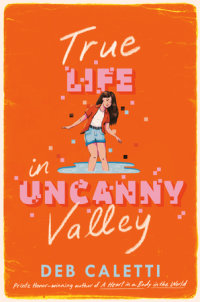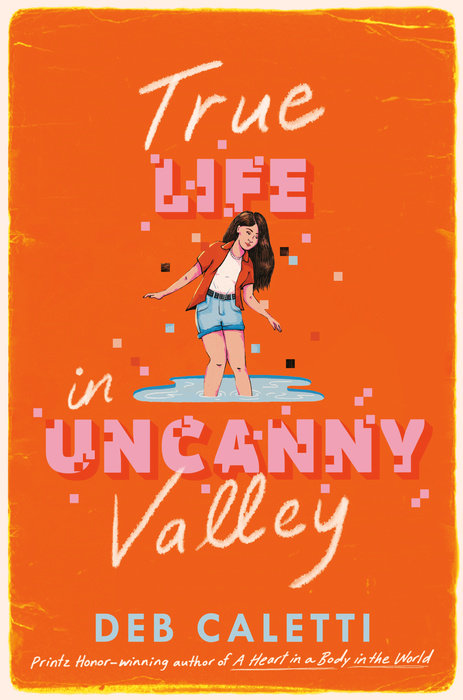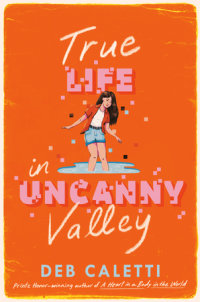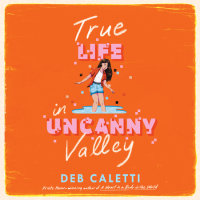True Life in Uncanny Valley
Author Deb Caletti
From the acclaimed author of A Heart in a Body in the World comes the gripping story of a girl living a lie in order to find the truth about her family and herself.
Eleanor, like so many others, is used to watching her famous father from afar. To the world, Hugo Harrison is the brilliant and charismatic tech genius whose AI inventions seem to create a new, better reality. But to Eleanor, whose mother had…
From the acclaimed author of A Heart in a Body in the World comes the gripping story of a girl living a lie in order to find the truth about her family and herself.
Eleanor, like so many others, is used to watching her famous father from afar. To the world, Hugo Harrison is the brilliant and charismatic tech genius whose AI inventions seem to create a new, better reality. But to Eleanor, whose mother had an affair with Hugo years ago, he is something even more intriguing, and dangerous—a secret.
When Eleanor’s spying leads her to a posting for a live-in summer nanny job for Hugo's young son—her half-brother—she knows she has to apply. This is finally her chance to learn about her father, his family, and the life that could have been hers. She only has to do one thing: become someone else. With just a few well-placed lies, Eleanor is catapulted into an unfamiliar, intoxicating whirlwind of money and ego, and into a new romance with a cute boy who works for Hugo. But in a place where image is everything and reality can be rewritten, is anything real—even the Harrisons themselves?
Caught between her own secrets and the ones she’s uncovering about her father and his latest invention, Eleanor faces a question that technology can't answer: what is your true self, and how do you know when you find her?
An Excerpt fromTrue Life in Uncanny Valley
Chapter One
So, I’m sitting in Mom’s old Ford Taurus, staring right inside his house. I don’t even need my binoculars--it’s night, and the rooms are lit up. Even in the day you can spy pretty easily because the place is all glass. If you were as famous as he is, you’d think you’d want privacy, but nope. It’s like everyone sees him, but he wants to be seen more, more, more. I mean, he lives in the biggest fishbowl ever. Huge, you can’t even imagine. Bowl isn’t really the right word--it’s more of a long architectural mishmash of off-kilter squares and rectangles, set on three hundred spec-tacular feet of Lake Washington waterfront. That’s practically a direct quote from every article ever written about the place, and, trust me, I’ve read them a hundred times.
Picture the extravagant, glinting lair of a titan in Gotham or Metropolis or Coast City. Yeah, the one that belongs to the brilliant, charismatic scientist of the comics, who’s also a conniving billionaire. He’s got headquarters downtown, too, in a build-ing that…
Chapter One
So, I’m sitting in Mom’s old Ford Taurus, staring right inside his house. I don’t even need my binoculars--it’s night, and the rooms are lit up. Even in the day you can spy pretty easily because the place is all glass. If you were as famous as he is, you’d think you’d want privacy, but nope. It’s like everyone sees him, but he wants to be seen more, more, more. I mean, he lives in the biggest fishbowl ever. Huge, you can’t even imagine. Bowl isn’t really the right word--it’s more of a long architectural mishmash of off-kilter squares and rectangles, set on three hundred spec-tacular feet of Lake Washington waterfront. That’s practically a direct quote from every article ever written about the place, and, trust me, I’ve read them a hundred times.
Picture the extravagant, glinting lair of a titan in Gotham or Metropolis or Coast City. Yeah, the one that belongs to the brilliant, charismatic scientist of the comics, who’s also a conniving billionaire. He’s got headquarters downtown, too, in a build-ing that towers over all the others, featuring a beam of neon shooting from the top. The doors spill workers with intellectual-outsider vibes.
He’s either the criminal mastermind or the real hero. That’s what I’m here to find out. Who is he? Who is he really?
Wait. I see him. Do I see him? No, it’s only a trick of the light. My heart hammers anyway, battering away in my chest. Hearts get confused about what’s real, and sneaking around to discover the truth is a scary business. I try to breathe deeply. If he’s the brilliant scientist, then I can only be one person. Okay, she’d never be this nervous, and she’d never be wearing these crappy old yellow leggings and the Oregon Caves T-shirt we got on the one major vacation that Mom and me and my sister, Rosalind, ever took. But that’s exactly why I need her. She’s my inspiration and my secret power. In that car I close my eyes, ever so briefly.
Pretend you’re opening an old comic book, the kind with really cool lettering and bold images colored in cyan and magenta, yellow and black. That’s what I do right then. It’s the Golden Age of Comics, so usually you only see chiseled superhero dudes, but not this time. This one features a woman. A woman you wish you could be. She’s so brave, and stylish, and sexy, and living an amazing life of heroes and villains. Bad guys, good guys, it’s all so clear. And, God, she’s totally gorgeous in that tight blue-black suit, strong and physical, not afraid of anyone or anything. No one is looking at her and judging, or not seeing her at all and judging. She’s just a force.
The comic book I envision opening is always the same one: Miss Fury, Summer Issue, No. 2, from 1942. On the cover, Miss Fury (in her regular life, Marla Drake) descends into a room with her cape flying. She kicks the shit out of some Nazis, and looks spectacular while doing it. How can you not be swept up? This is the first female superhero ever drawn by one of the first female cartoonists, June Tarpé Mills. Double inspiration, triple. Miss Fury herself, plus her creator, both of them up in a fight against sinister motivations and impossible odds, and then . . . that art. Man, I wish I could draw like that. One day I will. Fiction is so great, you know. It saves you. It holds your hand and gives you a kick in the butt. It’s there for you, even while you sit in a Ford Taurus outside a billionaire’s house.
I open my eyes. The hammering in my heart has slowed. Hey, it’s still here, the house made of 2,019 framed panes of glass. I’m still here, too, even if he doesn’t--can’t, won’t--see me.
Get it? Frame? 2019? Yep, that Frame, the very first, splashiest, most innovative AI art generator ever, released that very year by the splashiest, most innovative tech dude ever, Mr. Charisma himself, Mr. Wild Card, Mr. What Shocking Thing Will I Do Next? Mr. Sexiest Man Alive (gross). Mr. This Billionaire Is Just a Regular Guy (a GQ article headline about him). Mr. I Created That App Where People Rate Each Other, Then I Created Frame. Mr. I’m Making Something New and Life-Altering Right This Minute, But It’s a Secret.
Well, now you know whose house I’m staring into right now. I’m hoping (badly hoping, it’s sad how much I’m hoping) to spot the great Hugo Harrison himself, or maybe his young, glamorous wife, Aurora, or their little two-year-old tot, Arlo. Or even their dog, Boolean. Boolean is a computer programming term, apparently. It’s one of those things you have to keep looking up because it just won’t stick in your brain. Boolean: a data result that has only one of two possible values, true or false. No idea. A lot of the stuff in Hugo Harrison’s life, same. AI, artificial intelli-gence, too--my mind can’t grasp the facts. What is it, actually? It’s nothing and everything. It’s hard to tell what’s real about it. It reminds me of when we were lit-tle and Rosalind insisted on reading the rules of every board game aloud. I’d stick my fingers in my ears and sing, Can’t hear you! and she’d yell for Mom to make me stop because it’s important, Eleanor! I just wanted to play. The game was cool, and we’d figure it out.
This is probably hard to understand, but the same thing goes for him. I don’t want to hear the rules; I just want to play. The game is so cool. I mean, just creating stuff like that. Ingenious, artistic, world-changing stuff, wow. Being a creator--it seems like the highest calling, you know. It’s a connection we have, too: He invented this whole app to make art, and I want to be an artist. If he’s either the criminal mastermind or the real hero in my personal comic book, I am seriously wishing for hero. The thing is--you can memorize every rule in an instruction book, but you won’t actually know a thing about the game until you’re playing.
I gaze in at the white living room, and I just wait for someone to enter the stage. It’s one way that Hugo Harrison and I are different, for sure, because being seen usually makes me deeply uncomfortable. He’s on magazine covers, and I turn red when I get called on in class. Once, in PE, a kid passed me the basketball during a game and I froze, and my teammates started yelling. After that I made sure to always run around and look busy, far from any actual ball. Private moments of excess attention can be even worse. Like that time my mom and sister decided I needed a makeover, and I had to parade out of my room wearing ripped jeans and a crop top featuring the word Amore in glitter. Oh geez. They were trying to be nice, but my insides curl up even thinking about it.
My sister said, Relax! Loosen up! and my mom said, You look great! but I felt like the baking-soda–and–vinegar volcano that never volcanoed. I could hear all the exclamation points they were using, ringing false. They both just looked at me for a moment, and then Rosalind sighed and said, Oh, Eleanor, and my mom laughed.
There’s a part of me that hopes that Hugo Harrison and I are more similar than different. A big part. At home I’m always the third wheel.
Wait, wait! There’s a flash of movement, for sure this time. I grab my binoculars. In the car right then, I’m not Oh, Eleanor. I’m Miss Fury, in my own frame, concealed in sleek black-blue. Unseen by choice, peering into the windows of my archnemesis, the gold-digging Baroness von Kampf. Another great thing about fiction? It states what it is and isn’t right up front. Not the truth, but speaking truth. Doing its best to convince you it’s real, but with your full knowledge and permis-sion. People shouldn’t try to trick us about that, about what isn’t real, though of course they do it all the time.
Is it a staff member? The Harrison family likes to keep its household employees to a minimum, in a constant goal to live as “normal” as possible, something that gets mentioned repeatedly in interviews. Normal, meaning not wealthy, which isn’t something normal people ever wish for. I’m pretty familiar with the regulars--the chef, Jak DeLario, former head chef of that chic restaurant The Block. Also the landscapers, and an older woman who’s the housekeeper, I’m pretty sure. There’s Hugo’s executive assistant, Mathew, too, and a few different nannies, who don’t seem to stay long. I focus, twist the dials for clarity; wouldn’t that be an awesome feature in real life?
Ah, the flash isn’t even a person. It’s just Boolean. He’s one of those huge, beautiful Bernese mountain dogs, the kind that always manage to look tired and hot and overburdened even when it’s a cold day. I watch him make his way down the Harrisons’ third-floor hall and collapse on the floor, as if it’s all suddenly too much to bear. I’ve had that exact same feeling a thousand times.
I touched him once, Boolean. He felt so good! The Harrisons had a dog walker for a while, this lady named Sahara or Sierra or something like that. I heard Aurora calling out a greeting to her once. An outdoor name that suggested adventure in the vast world when she pretty much just walked around Laurelhurst with rich people’s dogs. Remind me if I ever have a baby not to name the poor kid something that she has to measure up to. Sahara or Sierra was the kind of dog walker you’d see in a romantic comedy where she’s always getting the leashes twisted up and almost tripping because she’s trying to talk on her phone at the same time. In her case, though, she only had Boolean. The point is, she was distracted enough that I could drive down the block, whip out of Mom’s car, and pretend I was just walking along from the other direction. Tra-la-la--oh, what a surprise! A gorgeous giant dog! I wanted to start up a conversation, you know, see if I could maybe get some little piece of information.
Those bits of information . . . It sounds pathetic, but they mean so much. They really do. I can relish a tiny detail same as a chocolate, savoring it as it slowly fades. Like that time a kid in my class bragged that he saw Hugo Harrison at Whole Foods, buying only a mango and a bar of avocado soap. This is embarrassing to admit, but I even went to Whole Foods and looked at the avocado soap to try to guess which kind. I mean, there were, like, six varieties, which is one of those things people from the pioneer days would find unbelievable. I find it pretty unbelievable now, to be honest. But I even picked them up, the white box with the artistic image of the avocado, the green box with no avocado, the cream box with the avocado line drawing, the box-less avocado soap stacked on the table with all the other scents, vanilla and papaya and mint, sitting there so creamy and smooth you want to bite them.
She was on the phone, though, distracted as they waited for a Walk sign. My hand sank into Boolean’s fur. He was a mountain, and his fur was the thickest thicket, and his eyes looked at me soulfully. They offered me kindness, because dogs, by some miracle, stay pure of spirit, and can’t give a shit about status. We sort of had a moment. I gave him love straight through my eyes, and he gave it right back. Possible values, true or false--Boolean is true.
The binoculars are supergood ones, expensive. I spent a lot of money on them last summer, when I first started watching Hugo Harrison. I had to use a lot of my savings, but they’re worth it. I can see the mountain of Boolean inhale and exhale, and I remember the feel of him, because hands have their own memory. I watch his eyes close. His bushy eyebrows fold together in a troubled V. I wonder if he’s dreaming of home. Of Bern, or of someone’s rec room where he was born. I wonder if he’s as confused as I am about where he came from and where he truly be-longs.
It’s cold in the car, and it’s getting chilly enough in here that I’d better go home or I’ll have to turn on the engine to warm up. We’re having an unexpectedly chilly spell for late April. Global warming, it’s overwhelming to think about. I even brought my fingerless gloves that Rosalind gave me. She said they’re stylish, but they suddenly seem ridiculous, like a lot of objects that aren’t whole but you pay good money for anyway--jeans with premade tears, doughnuts, crop tops that say Amore. It’s getting late, and sitting there in the dark with the motor running, and in a car like this, outside of Hugo Harrison’s house--someone might call the police. I’ve wanted to do it myself, those times I’ve seen that guy sitting in his truck watch-ing this same house, because what are you up to, dude? In a comic, when the police arrive, it’s an exciting moment of old-timey black-and-white cars surrounding the place, exclamation points galore. In real life, it would just be terrifying.
I put the binoculars back in their little pouch and zip them in. I picture the word Zip! in an energetic font. I imagine sketching those words, and for a moment I think about the beautiful, individual personalities of fonts--quiet or bold or elegant. Just as quickly, I’m aware that these are the kinds of thoughts my mom and sister tease me about when I say them out loud, so I’ve pretty much stopped. When I try to explain how a city skyline can look both menacing and reassuring, depending on how it’s drawn, or how thrilling it is when good trumps evil on a page since it’s such a lie in real life--they look at me like I’m from another planet. Two different planets under one roof are a lot of planets.
I’m about to leave when something unusual happens. A truck arrives. It drives around to the service entrance, where I can’t see anything. But, whoa, lights are coming on, too. More lights. Boom, boom, boom--like a Broadway show about to start.
What is going on? There’s a sudden flood of commotion. The front door opens, and several young women come out. They line the front walk with votives and light them. Incredible. Magic. Inside, it’s as if a flower is blooming, or lots of flowers--everything opens, brightens. My eyes blink from the beauty. Actual flowers whoosh in, too. Arrangements on tables, and more outside. Even though the backyard is hidden from here, I know what it looks like. If you rent a kayak at the UW campus, you can see it from the lake. I only did that once, because kayak. Let me tell you, if you put too much weight to one side, you just go round in circles. This is both a life truth and a kayak truth.



